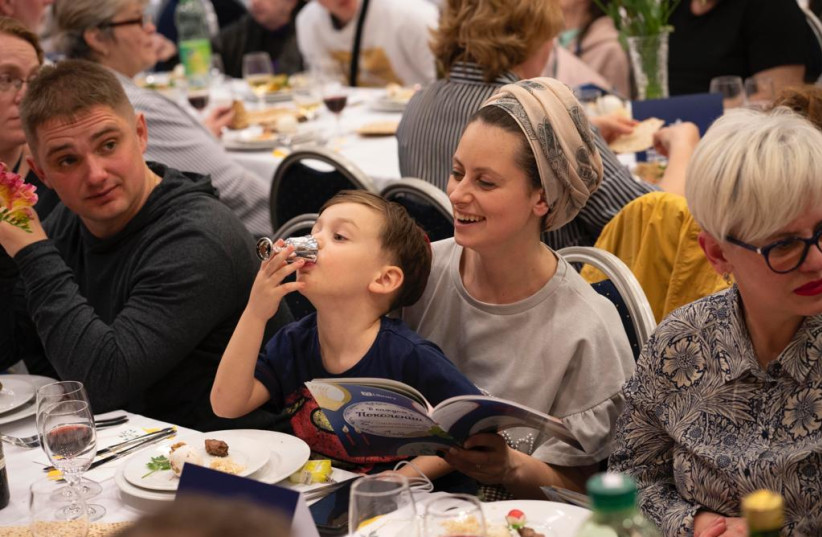Aside from the threat of higher gas prices, perhaps the biggest effect of the war so far on Germany has been the arrival of roughly 400,000 Ukrainian refugees. This influx is likely to have profound long-term effects on the local Jewish community. For decades after the Holocaust, the community totaled roughly 30,000 people, spread out among almost 100 locations. Then came the breakup of the USSR in 1991: Germany gave over 200,000 Jews permanent residence. Some left, but many stayed – saving the community from demographic extinction. Today, these former citizens of the FSU and their children comprise no less than 80% of Germany’s Jews. Add to that roughly ten thousand young Israelis drawn to Germany’s booming economy and cultural life, and the German Jewish community today includes roughly 125,000 people.
Many Jewish Ukrainian refugees – no one know how many, but it is certainly thousands - are choosing to come to Germany. Why? They are looking for quiet and Israel is seen as being dangerous. In addition, Germany has committed significant resources to help: Ukrainian refugees receive the same welfare support as German citizens.
What is happening currently? I asked several contacts in Germany.
Aron Schuster, the director of the Central Welfare Board of Jews in Germany (ZWST), pointed out that at least 40% of German Jews today have their roots in the Ukraine itself - making integration much easier and helping explain why Germany is a desirable destination for them. Some have relatives and/or friends in Germany and come on their own. Thousands, though, rely on the Jewish community. Rabbi Shlomo Bistriky, chief rabbi of (and head Chabad shaliach in) Hamburg, explained a crucial difference between this wave of Jewish refugees and that of 30 years ago.
Then, few Jews in the FSU were connected to the Jewish communities in the Ukraine – and didn’t particularly look for one in Germany. “This time is different,” explained the rabbi. “Over recent decades there has been a strong resurgence of Jewish life in the Ukraine. Most of the refugees were part of Jewish communities. Many had a Jewish education. They come to shul. They want to be involved.”

Early on in the crisis, most refugees went to Berlin. Ita Afanasev, Director of JAcademy, a Jewish education project for European Jewish students of Lauder Yeshurun, Olami and other foundations, explained that few refugees have attended their events, as most are still reeling from the massive recent changes in their lives. However, local students from Olami’s popular Morasha program have been active in raising money and collecting supplies for the refugees, in conjunction with KAJ (Kahal Adass Jisroel). One challenge is simply geography, as she explained, “Berlin is filled with refugees. The city isn’t accepting any more people... We are working on ways of keeping the students and Jewish families in Berlin, as this is the only place at the moment where it is easy to stay Jewish.”
Indeed, more and more of the refugees are being directed to smaller communities. One example is Ulm-Württemberg, a city of 125,000 residents near Munich. Roughly 50 Ukrainian Jewish refugees have arrived in Ulm since the war began – a large number for a community of roughly 500. Local Rabbi Schneur Trebnik explains that, “some of these people came with nothing – literally nothing. They need basic clothes and money for food.” Now that the first wave is over, they are trying to find apartments for the families to live in. The challenge? “There are hardly any apartments available – the system just wasn’t set up for so many refugees in such a short time.”
In Hamburg, roughly 60 refugees so far have joined the community. The children have joined the Jewish school – half a day learning in Russian in a special class, the other half day integrating into regular classes. The community provides meals and special activities Local Jewish students and community members – most of whom speak Russian – have been very active in helping the refugees in many ways. In Ulm, almost every refugee came to the community seder on the first night of Passover!
Will the Refugees Remain in Germany?
Those I spoke with had various thoughts on the subject. Aron Schuster of the Welfare Board noted that “90% of the refugees are telling us they want to go back to the Ukraine.” Indeed, he points out that a few already returned to Kiev when the Russian army withdrew from it.
Although, Rabbi Bistrizky in Hamburg believes that “in the end, most will stay. It won’t be simple to return to the Ukraine anytime soon... and the alternative is living in Germany with a strong social net.”
Rabbi Trebnik of Ulm mentions one family consisting of a grandmother, daughter and granddaughter. The family was originally from Donetsk, but when Russian-backed separatists took over the area in 2014, they fled to Kiev. When the recent invasion began, the family escaped to Holland, but were not granted permanent residence status there, so they came to Germany, where Jewish refugees can (almost always) stay as long as they want. This family is clear that they never want to go back to the Ukraine. They have witnessed two wars in eight years.
They want peace and quiet, and Germany is an attractive – and relatively comfortable – refuge for Ukrainian refugees.
The writer is a bestselling author and international speaker who has taught in Germany many times and works with all the organizations mentioned here.
